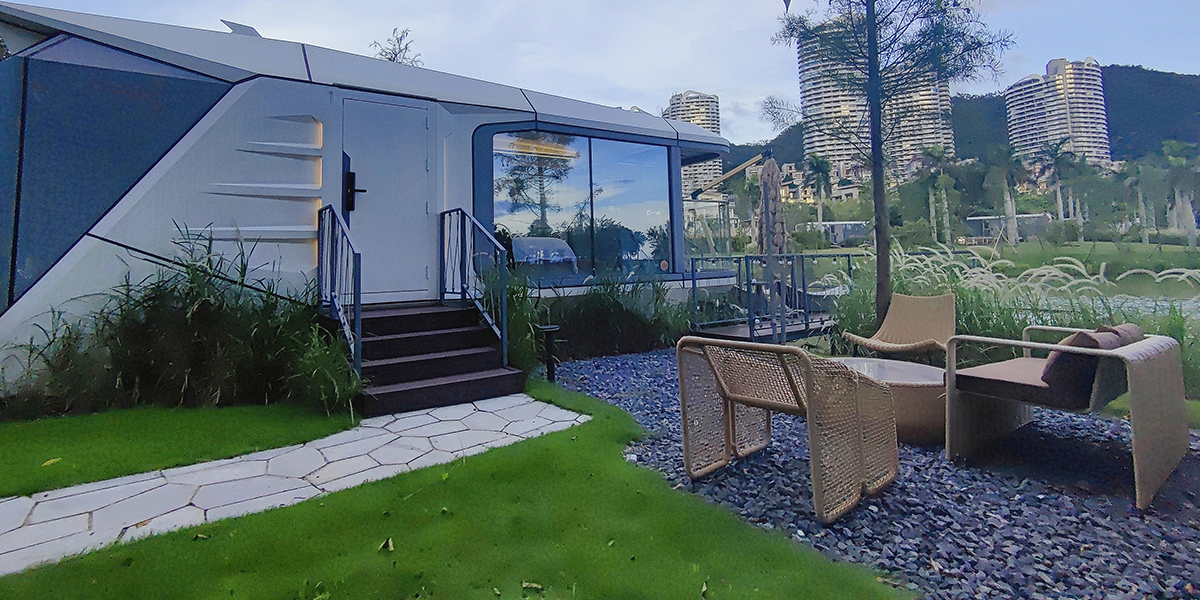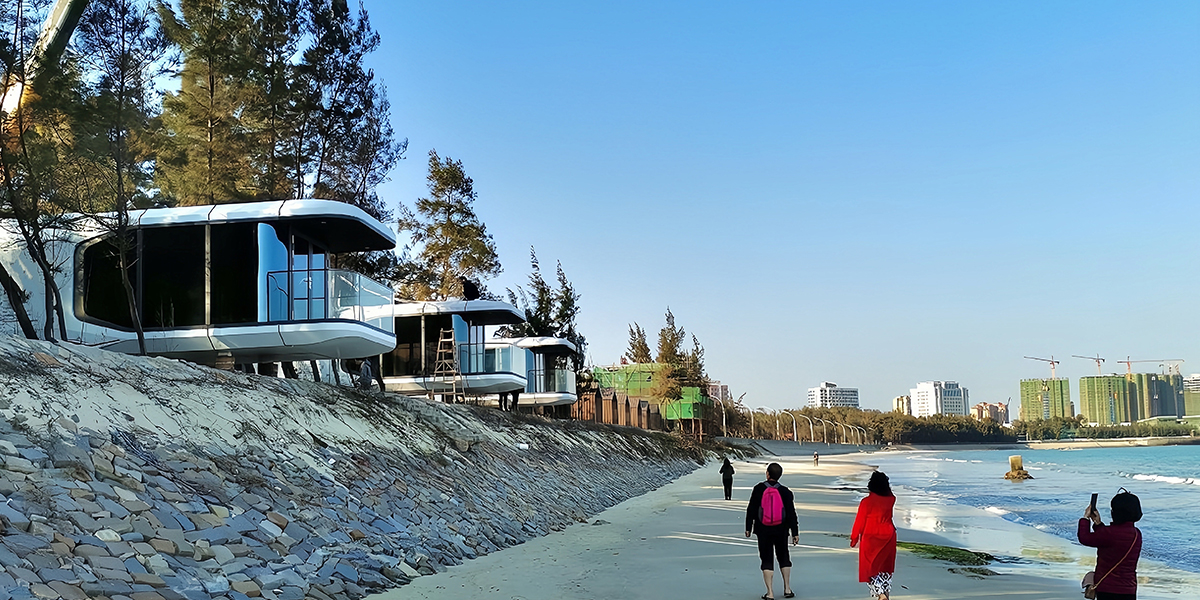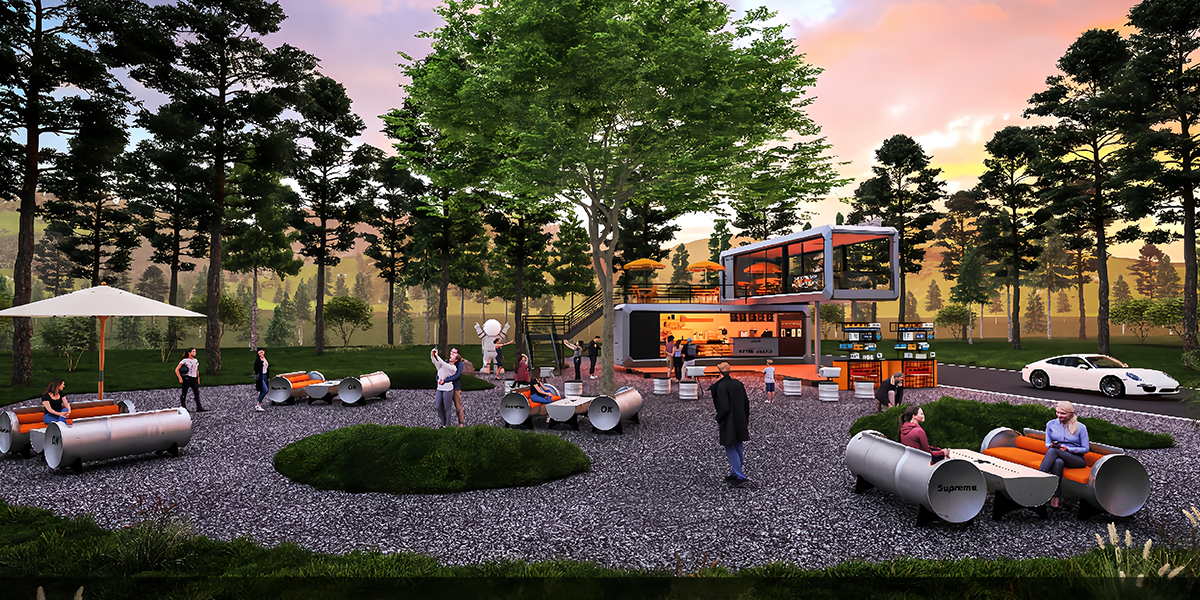
31 Aug Investing in capsule house in the USA cost-effectiveness
Table of Contents
If you want a smart and cheap way to buy a home, investing in capsule house options in the USA can save money. Capsule house designs are known for being affordable and using less energy. Many people pick a capsule house because prices are often between $10,000 and $100,000. You see more capsule house projects as buyers want special, small homes that help save money.
Key Takeaways
Capsule houses cost a lot less than normal homes. They usually cost between $10,000 and $100,000. They help you save money on energy bills. They also save money on repairs and upkeep.
Investing in capsule houses lets you build them fast. You can get steady rental income from them. They also have good resale value. This makes it a smart way to grow your money.
You can pick prefab models if you want to spend less. Prefab models are quick to set up. You can pick custom models if you want more style and comfort. Your choice depends on your budget and what you want.
Capsule houses use space in a smart way. They are good for the environment. Renters and buyers like homes that are cheap and green.
You should check local laws before you invest. Make sure there is demand for homes in the area. Look at your financing options carefully. This helps you avoid risks and make your capsule house investment work well.
Capsule House Cost
Initial Cost
Capsule house prices can be very different. Most capsule house prices are between $10,000 and $100,000. Some models cost less, but they have fewer features. If you want more space or special designs, you pay more. The price per square foot is usually lower than a regular home. Many prefab models are quick and easy to start. Prefab models cost less because they are built in a factory. Custom models let you pick your own style, but they can cost more.
There are many things that change the final cost. The size of your capsule house is important. Bigger models cost more money. The materials you pick also change the price. Some people want eco-friendly materials, which can make it cost more. Customization makes the price go up, too. If you want smart home features or special layouts, you pay extra. Energy efficiency can save money later, but it may cost more at first. You should compare different models before you choose. This helps you find the best deal for your budget.
Tip: Write down your must-have features before you pick a model. This helps you avoid extra costs that might surprise you later.
Ongoing Cost
After you buy your capsule house, you will have more costs. Utilities like water, electricity, and internet are part of your monthly bills. Many capsule house models use less energy, so you can save money. Maintenance is another cost to think about. Smaller models need less work, but you still need to plan for repairs. Insurance is important, too. Some companies have special rates for capsule house models, but prices change by location.
You also need to pay property taxes. These taxes depend on where your capsule house is. Some places have lower rates for small homes. You should ask about this before you buy. Long-term costs can add up if you do not plan well. Think about hidden costs like permits, site work, and upgrades. These costs may not show up at first, but they add to your total capsule house cost over time.
Here is a simple table to help you track your ongoing expenses:
Expense Type | Typical Range (Monthly) | Notes |
|---|---|---|
Utilities | $50 – $150 | Depends on energy use |
Maintenance | $20 – $100 | Varies by model and age |
Insurance | $30 – $80 | Location affects prices |
Property Taxes | $10 – $60 | Local rates apply |
Hidden Costs | Varies | Permits, upgrades, repairs |
You should check your long-term costs every year. This helps you stay on budget and avoid surprises. Many capsule house models keep costs low, but you need to watch for hidden costs. Good planning makes your investment safer and better.
Investing in Capsule House
 Returns
Returns
When you invest in capsule house projects, you get many benefits. You can make money in different ways. Many people pick this investment for strong returns. You can rent out your capsule house and get steady rental money. Lots of people want small, cheap places to live, so your capsule house is often full. This means it does not stay empty for long.
You can also sell your capsule house later. The resale value can stay high if you keep it nice. Some buyers want special homes that cost less to run. This helps you get a good price when you sell. More people want simple, energy-saving homes, so the investment potential grows.
Capsule houses have another big plus. You can build them much faster than regular homes. This lets you start making money quickly. You do not need to wait a long time to see returns. Fast build times help you earn money sooner.
Note: Many investors see that capsule houses have lower risk and faster profits than regular homes.
Income Streams
You can make money in many ways by investing in capsule house properties. The most common way is rental income. You can rent your capsule house to travelers, students, or people who need a short stay. Many people use websites to list their capsule house for rent. This makes it easy to find guests all year.
Some investors use capsule houses as vacation rentals. You can charge more during busy times. This helps you earn more money. You can also offer long-term rentals for people who want to stay for months. This gives you steady cash flow.
Here is a table to show possible income streams:
Income Stream | Description | Potential Benefit |
|---|---|---|
Short-term Rental | Rent to travelers or tourists | Higher nightly rates |
Long-term Rental | Lease to tenants for several months | Steady monthly income |
Vacation Rental | Offer as a holiday home | Seasonal income boost |
Resale Value | Sell the capsule house after a few years | Profit from appreciation |
You also get flexibility with this investment. You can move your capsule house to a new place if you want. This helps you keep up with market changes. The sustainability of capsule houses attracts eco-friendly renters and buyers. Many people want homes that use less energy and are better for the planet. This makes your investment more attractive for the future.
Tip: If you talk about the benefits of capsule houses, you can market your property to people who care about the planet and saving money.
When you look at the investment potential of capsule houses, you see many ways to make money and grow your wealth. The long-term outlook is good as more people want affordable, flexible, and green homes. Investing in capsule house properties lets you enjoy these benefits and build a strong investment for the future.
Capsule House Models
There are two main capsule house models. You can pick prefab models or custom models. Each type has different costs and benefits. Learning about both helps you choose the best one.
Prefab Models
Prefab models are built in factories. They come ready to put together. These models cost less because they are made in large amounts. Workers can set them up in a few days. Most prefab capsule house models have simple designs. You do not get many choices for changes, but you pay less. Many investors like prefab models. They are cheap and quick to rent out.
Here is a table that shows how prefab and custom models compare:
Feature | Prefab Models | Custom Models |
|---|---|---|
Cost | Lower | Higher |
Installation | Fast | Slower |
Customization | Limited | High |
Prices | $10,000–$50,000 | $40,000–$100,000+ |
Tip: Prefab models help you save money and start earning fast.
Custom Models
Custom models let you design your own capsule house. You can choose the size and layout you want. These models often use better materials. They give you more comfort. Custom models cost more, but you get a special home. Some investors pick custom models to stand out. Custom capsule houses can attract renters who want something different. You pay more for these models, but you might earn more from higher rent.
Think about your goals before you choose a model. If you want to spend less and earn fast, prefab models are best. If you want a special home, custom models give you more choices. Both types can help you invest well. Your choice depends on your budget and plan.
Comparison
Traditional Housing
You might wonder how capsule house models are different from regular homes. Regular homes usually cost more and take longer to build. You often wait many months before moving in. Regular homes use more space and more building materials. This means you pay extra for heating and cooling. Repairs can also cost a lot. You also pay higher property taxes and insurance.
Capsule house models are not the same. You can get your home much faster. You spend less money on energy and fixing things. Many models use smart designs to save space. There are lots of models to pick from. Some models are made to be better for the environment. Most buyers find capsule house models save more money.
Here is a table to help you compare:
Feature | Capsule House Models | Traditional Homes |
|---|---|---|
Build Time | Weeks | Months |
Cost | Lower | Higher |
Energy Use | Efficient | High |
Maintenance | Simple | Complex |
Flexibility | High | Low |
Tip: If you want a fast and cheap home, capsule house models give you more options.
Tiny Homes
Tiny homes are also a popular choice. You can find many tiny home models for sale. These homes are small and easy to move around. Some models use recycled materials. A few models have wheels so you can travel. Tiny homes usually cost less than regular homes, but some are still pricey.
Capsule house models are special because they use space really well. You get more places to store things and more comfort. Many models help you save energy. You can pick a style you like. Some models are easier to set up than tiny homes. Capsule house models give you more ways to use your home. You can even move some models to new places.
Note: When you look at different models, check the features and long-term value. Capsule house models often give you more for your money.
Key Factors
 Location
Location
You need to think about location before you invest in a capsule house. The place you choose affects your costs and your returns. Some areas have high demand for small homes. Cities with many students or tourists often have better rental rates. Rural places may offer lower land prices, but you might see less demand. You should check if your chosen spot has easy access to utilities and roads. Good locations help you rent out your capsule house faster. You also want to look at local weather. Some models work better in warm climates, while others suit colder areas. Make sure your budget matches the price of land and setup in your area.
Tip: Visit the location before you buy land. Talk to local people and learn about the area’s needs.
Regulations
Rules and laws can change your plans for capsule house investment. You need to check local zoning codes. Some places allow capsule house models, but others do not. You should ask about building permits and safety rules. Some cities have size limits for small homes. You may need special approval for certain models. Insurance companies also look at local laws before they offer coverage. If you skip this step, you might face fines or delays. Always read the rules before you buy or build. This helps you avoid problems and keeps your budget safe.
Financing
You have many choices for financing your capsule house. Some banks offer loans for prefab models, while others prefer custom models. You can use personal savings or get help from family. Some investors use crowdfunding or special home loans. You should compare interest rates and loan terms. Make sure your budget covers all costs, including setup and permits. Some lenders ask for higher down payments for unique models. You need to show your income plan if you want a loan. Good financing helps you start your capsule house project with less stress.
Financing Option | Good For | Things to Check |
|---|---|---|
Bank Loan | Most models | Interest rate, terms |
Personal Savings | Any model | Total budget needed |
Crowdfunding | Custom models | Investor rules |
Home Equity Loan | Existing owners | Approval process |
Note: Always talk to a financial expert before you choose a loan. This helps you protect your budget and avoid mistakes.
Risks
Market
You face market risks when you invest in capsule houses. Prices can change quickly. Demand for small homes may go up or down. If fewer people want capsule houses, you might earn less money. You should watch local trends. Some cities have strong demand, but others do not. You need to check if people want to rent or buy in your area.
Tip: Study the market before you invest. Look at rental rates and sales prices for capsule houses near you.
Here is a simple list of market risks:
Changing demand for small homes
Fluctuating rental prices
Competition from other housing options
Legal
Legal risks can affect your capsule house investment. Every city has different rules. Some places do not allow capsule houses. You need to check zoning laws and building codes. If you do not follow the rules, you could face fines. Insurance companies may not cover your property if you break local laws.
You should talk to local officials before you build or buy. Ask about permits and safety rules. Make sure your capsule house meets all legal requirements.
Legal Risk | What You Should Do |
|---|---|
Zoning issues | Check local zoning codes |
Permit problems | Get all needed permits |
Insurance limits | Confirm coverage options |
Space
Space risks are unique to capsule houses. These homes are small. You may feel cramped if you do not plan well. Storage can be a problem. Some models do not have enough room for your things. You need to think about your needs before you buy.
If you want to rent your capsule house, some guests may not like small spaces. You should design your home to use space wisely. Add shelves and smart storage solutions.
Note: Test the space before you invest. Spend time in a capsule house to see if it fits your lifestyle.
You can avoid space risks by choosing the right model and planning your layout. Smart design helps you make the most of every inch.
Tips
Location Choice
You should pick your capsule house location with care. Good locations help you get more renters and higher returns. Look for places near schools, hospitals, or tourist spots. These areas often have more people looking for short-term stays. Check if the land has easy access to water, power, and roads. You can also ask local agents about the best neighborhoods for small homes. If you want to use cost-saving strategies, compare land prices in different towns before you buy.
Tip: Visit the area at different times of day. This helps you see if it feels safe and quiet.
Design
Smart design makes your capsule house stand out. Choose a minimalist style to keep your space open and easy to clean. Use light colors and big windows to make the room feel larger. Add built-in shelves and hidden storage to save space. Pick furniture that folds or stacks. A multi-functional table can work as a desk, dining spot, or even extra counter space. You should plan your layout before you buy anything. This helps you avoid clutter and makes your home more comfortable.
Design Idea | Benefit |
|---|---|
Foldable furniture | Saves space |
Built-in storage | Reduces clutter |
Light colors | Makes rooms look bigger |
Marketing
You need a good plan to attract renters or buyers. Take clear photos of your capsule house. Show off the best features, like energy savings or smart storage. Write simple ads that explain why your home is special. Use websites and social media to reach more people. You can also ask guests to leave reviews online. Good reviews help you build trust with new renters. Offer short tours or open houses if possible. This lets people see the space and ask questions.
Note: Highlight your capsule house’s unique design and location in every ad. This helps you stand out from other listings.
Capsule houses are a cheaper way to buy a home. They do not cost as much as regular houses. You can build them quickly and pick from many styles. There are some risks, like prices changing or not having enough space. Many people think capsule houses are a good choice for investing.
Want more info? Look up local zoning laws, ask real estate pros, or visit capsule house makers to learn more.
FAQ
What is a capsule house?
A capsule house is a small, efficient home. You get a compact living space with smart storage. Most models use less energy and cost less than regular homes. You can use them for living, renting, or as a guest house.
How long does it take to build a capsule house?
You can set up most prefab capsule houses in a few days or weeks. Custom models may take longer. You save time compared to building a traditional house.
Can you finance a capsule house?
Yes, you can use loans, savings, or crowdfunding. Some banks offer special loans for prefab homes. Always check the terms before you choose a financing option.
Are capsule houses legal everywhere?
No, some cities or towns have rules about small homes. You need to check local zoning laws and permits before you buy or build. This helps you avoid legal problems.
What are the main benefits of investing in capsule houses?
You spend less money, save energy, and get flexible use. Capsule houses attract renters who want affordable and eco-friendly homes. You can also move some models to new locations.
Tip: Always research your area and talk to experts before you invest.




 Returns
Returns Location
Location